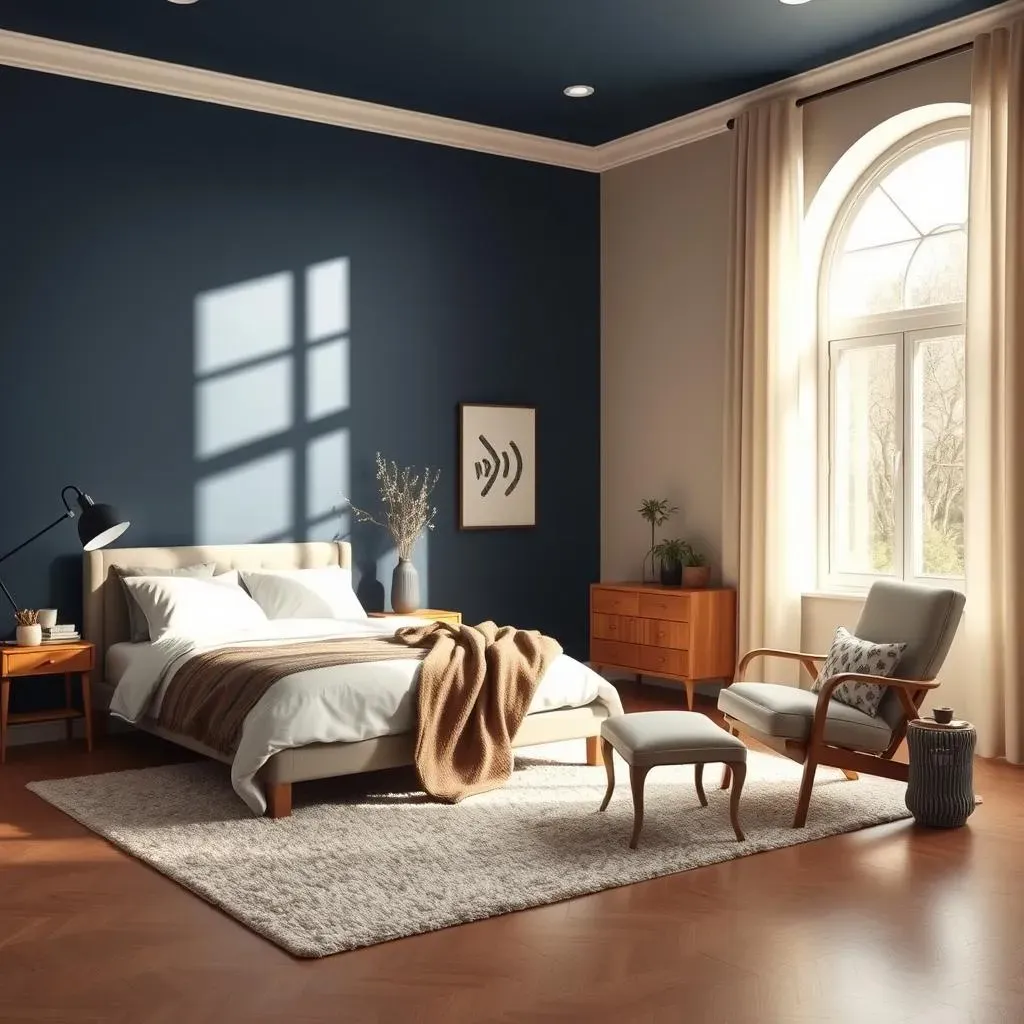Table of Contents
Tired of the same old bedroom look? Ready to inject some serious personality into your personal space? Forget the outdated design rule that says you're limited to just one accent wall. We're diving headfirst into the world of 2 accent walls in bedroom design, and trust me, it's a game-changer. This isn't about chaos; it's about creating a balanced, visually stunning space that reflects your unique style. Think of it as doubling the opportunity to showcase your favorite colors, textures, and design elements. In this article, we'll explore why choosing two accent walls can be a brilliant move, how to select the perfect color and material combinations, where to strategically place those walls for maximum impact, and a treasure trove of DIY and beyond-creative ideas to get you started. So, ditch the design dogma and prepare to unlock the full potential of your bedroom with the power of two!
Breaking the Mold: Why Choose Two Accent Walls in Your Bedroom?
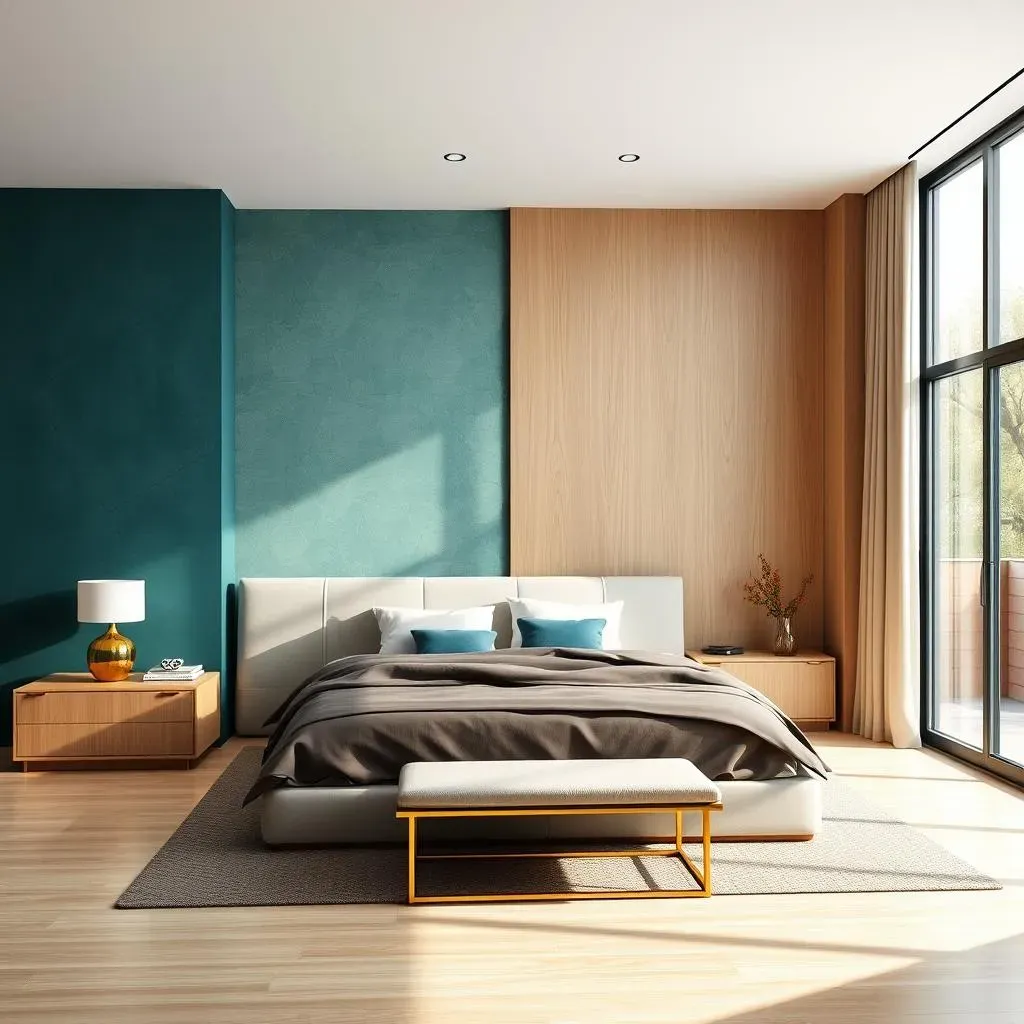
Breaking the Mold: Why Choose Two Accent Walls in Your Bedroom?
Beyond the Single Statement: Redefining Bedroom Design
For years, the accent wall has been the go-to design trick for adding a pop of color or texture to a room. But let's be honest, sometimes one wall just doesn't cut it. It can feel a bit…lonely. Choosing two accent walls throws that rulebook out the window, offering a chance to create a more dynamic and engaging space. It's about moving beyond a single statement and crafting a cohesive design narrative that wraps around the room.
Think of it like this: instead of a solo performance, you're creating a duet. Two accent walls allow you to play with contrast, balance, and visual interest in ways a single wall simply can't achieve. It's a bolder move, sure, but the payoff can be huge – a bedroom that truly reflects your personality and design sensibilities.
Creating Balance and Harmony: The Power of Visual Weight
One of the biggest advantages of using two accent walls is the ability to create a sense of balance and harmony in your bedroom. This is especially useful if you have a room with asymmetrical features, such as a large window on one side or a prominent architectural element on the other. By strategically placing your accent walls, you can visually even out the space and create a more pleasing overall composition.
Consider the concept of "visual weight." Darker colors and bolder patterns tend to feel heavier, while lighter colors and simpler textures feel lighter. You can use this principle to your advantage by placing a darker accent wall opposite a lighter one, or by balancing a patterned wall with a solid one. The goal is to create a sense of equilibrium that feels both visually appealing and emotionally calming. It's all about finding that sweet spot where the two walls work together to enhance the overall atmosphere of the room.
Scenario | Solution with Two Accent Walls |
|---|---|
Long, narrow bedroom | Accent walls on the shorter ends to visually widen the space. |
Bedroom with a large window on one side | Accent wall on the opposite side to balance the visual weight. |
Asymmetrical room | Strategic placement to create visual equilibrium. |
Expressing Your Unique Style: Doubling the Design Opportunities
Ultimately, choosing two accent walls is about expressing your unique style and creating a bedroom that truly feels like your own. It's an opportunity to double down on your favorite colors, textures, and design elements. Maybe you love the drama of a dark, moody wall, but you're afraid it will make the room feel too small. By pairing it with a lighter, brighter accent wall, you can achieve the best of both worlds – drama and spaciousness.
Perhaps you're drawn to the natural warmth of wood paneling, but you don't want to commit to an entire room of it. Using wood paneling on one accent wall and a complementary paint color on the other allows you to incorporate your favorite material without overwhelming the space. The possibilities are truly endless! Don't be afraid to experiment, play with different combinations, and let your personality shine through. After all, your bedroom should be a reflection of who you are, and two accent walls offer twice the canvas to express yourself.
Color and Material Harmony: Selecting the Right Palette for Your Two Accent Walls
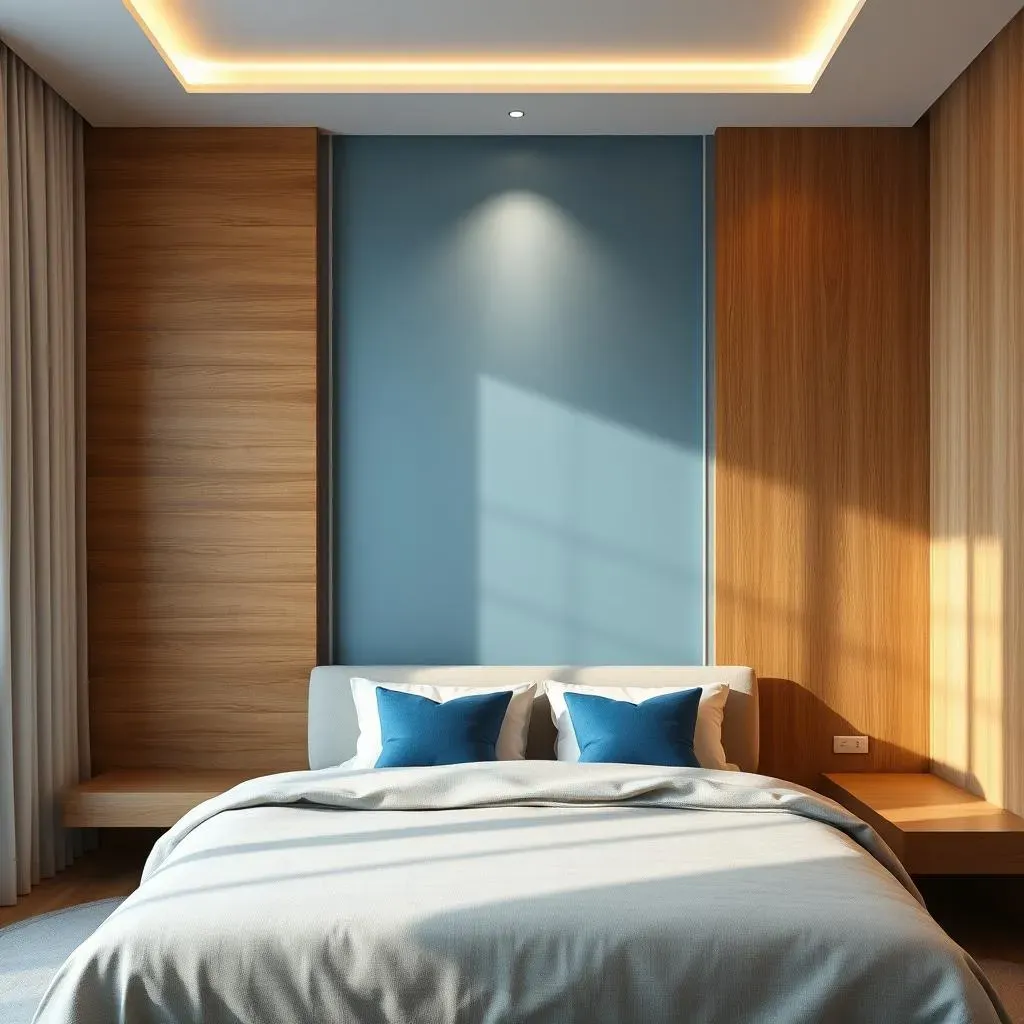
Color and Material Harmony: Selecting the Right Palette for Your Two Accent Walls
Decoding Color Psychology: Setting the Mood
Alright, let's talk color! When you're dealing with two accent walls, it's not just about picking your favorite hues; it's about understanding how those colors will interact and influence the overall mood of your bedroom. Color psychology is a real thing, and it can have a surprisingly powerful impact on your emotions and well-being. Think about it: a vibrant red might energize you in the short term, but could it lead to restlessness over time? A calming blue, on the other hand, might promote relaxation, but could it also feel a bit too cool or detached?
Before you even crack open a paint can, take some time to consider what kind of atmosphere you want to create in your bedroom. Do you want it to feel cozy and inviting? Serene and spa-like? Bold and dramatic? Once you have a clear vision in mind, you can start exploring color palettes that align with your goals. And remember, it's okay to break the rules! If you're drawn to unconventional combinations, go for it. The most important thing is that you create a space that feels authentic to you.
Material Matters: Texture and Dimension
so color is key, but don't underestimate the power of texture! When you're working with two accent walls, incorporating different materials can add a whole new level of depth and visual interest to your bedroom. Think beyond paint – consider wood paneling, textured wallpaper, brick, fabric, or even metal. The possibilities are endless!
The key is to choose materials that complement each other and enhance the overall aesthetic of your room. For example, if you're going for a rustic, farmhouse vibe, you might pair a shiplap accent wall with a painted brick wall. Or, if you're aiming for a more modern, minimalist look, you could combine a smooth, concrete wall with a sleek, metal accent wall. Don't be afraid to mix and match different textures to create a unique and personalized space. Just remember to keep the overall balance in mind, and avoid overwhelming the room with too many competing elements.
Creating Cohesion: Tying It All Together
So, you've picked your colors, you've chosen your materials…now what? The final step is to ensure that your two accent walls work together to create a cohesive and harmonious design. This means paying attention to the details and finding ways to tie everything together. One simple trick is to repeat a color or material from one accent wall on the other, even in a small way. For example, if you have a blue accent wall with white trim, you could add a few blue accents to the other wall, such as a piece of artwork or a decorative pillow.
Another way to create cohesion is to use a unifying element, such as a common theme or style. If you're going for a bohemian vibe, you might incorporate macrame wall hangings or woven tapestries on both accent walls. Or, if you're aiming for a more minimalist look, you could keep the colors neutral and focus on clean lines and simple shapes. The goal is to create a sense of visual connection between the two walls, so that they feel like they belong together in the same space. With a little bit of planning and attention to detail, you can create a bedroom that is both stylish and harmonious.
Strategic Placement: Where to Put Your 2 Accent Walls for Maximum Impact
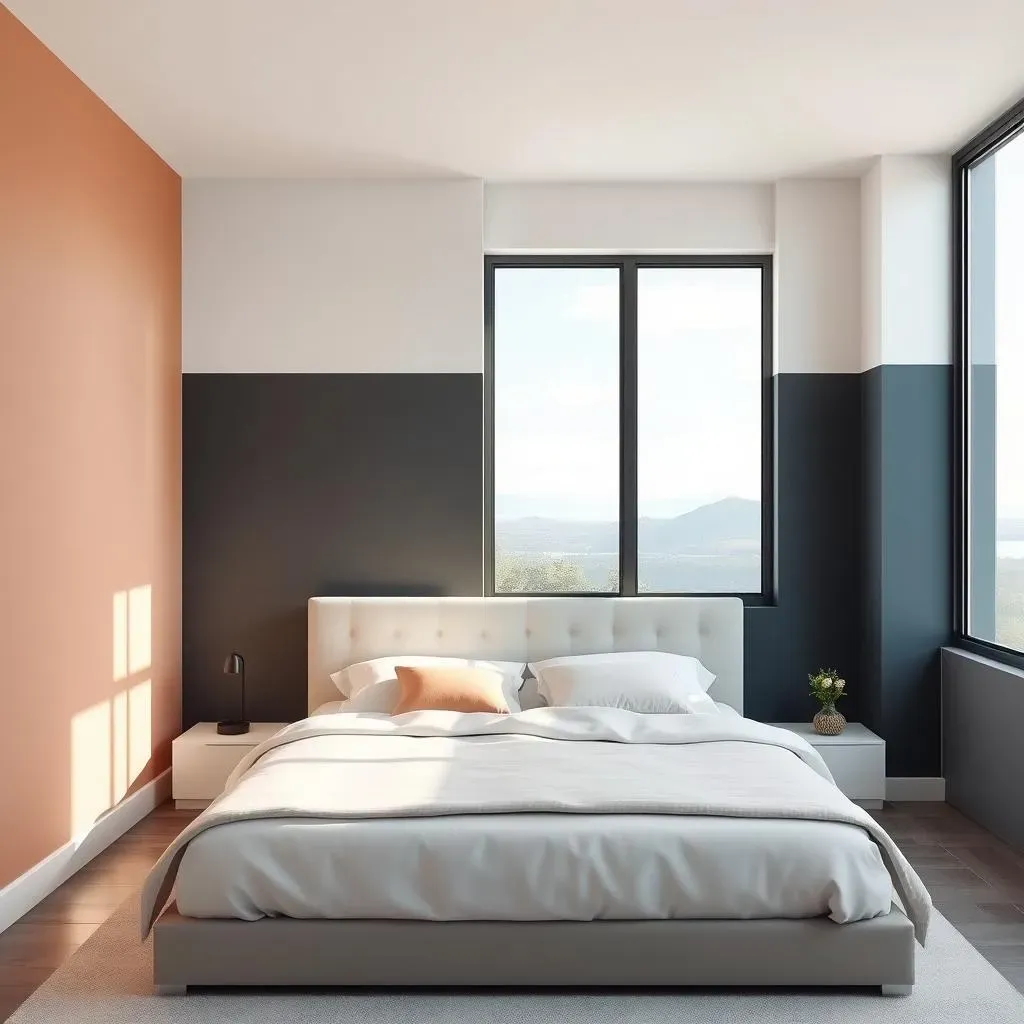
Strategic Placement: Where to Put Your 2 Accent Walls for Maximum Impact
Behind the Bed: A Classic Choice with a Twist
Let's start with a classic: the wall behind the bed. It's a natural focal point in most bedrooms, making it a prime candidate for an accent wall. But when you're working with two accent walls, you have to think a little differently. Instead of just slapping some paint on the wall behind your headboard, consider how you can use the second accent wall to complement and enhance that focal point. Maybe you choose a contrasting color for the second wall to create a sense of depth, or perhaps you use a similar texture to tie the two walls together. The key is to create a visual connection between the two walls, so that they feel like they're part of the same design story.
What if you don't have a headboard? No problem! You can still use the wall behind your bed as an accent wall. In fact, this can be a great opportunity to get creative and experiment with different design elements. Consider adding a large piece of artwork, a gallery wall, or even a decorative screen to create a focal point. Just make sure that whatever you choose complements the other accent wall and enhances the overall aesthetic of your room.
Walls with Windows or Doors: Embracing Architectural Features
Don't shy away from using walls with windows or doors as accent walls! While it might seem counterintuitive, these architectural features can actually enhance the impact of your design. The key is to work with the existing elements and find ways to integrate them into your overall vision. For example, if you have a large window with a beautiful view, you might choose a color for the accent wall that complements the natural scenery outside. Or, if you have a unique door with interesting hardware, you could use the accent wall to highlight those details.
Consider painting the window trim or doorframe a contrasting color to make them stand out even more. Or, you could add curtains or blinds that complement the accent wall and tie the whole look together. The possibilities are endless! Just remember to keep the overall balance in mind and avoid overwhelming the space with too many competing elements. The goal is to create a cohesive design that celebrates the unique features of your bedroom.
Architectural Feature | Accent Wall Strategy |
|---|---|
Large Window | Choose a color that complements the view. |
Unique Door | Highlight the door with a contrasting color or texture. |
Built-in Shelves | Paint the shelves the same color as the accent wall for a cohesive look. |
Walls Without Headboards: Creating a Focal Point
What if you're rocking a minimalist vibe and ditching the headboard altogether? Fear not! You can still create a stunning bedroom with two accent walls, even without that traditional focal point. The trick is to get creative and find alternative ways to draw the eye and anchor the space. One option is to use a large piece of artwork as a focal point. Choose a piece that complements the accent walls and adds a touch of personality to the room. Another option is to create a gallery wall with a collection of your favorite photos, prints, or artwork.
Consider using a decorative screen or room divider to create a sense of separation and define the sleeping area. Or, you could simply paint the wall behind your bed a different color than the other accent wall to create a subtle but effective focal point. The key is to experiment and find what works best for you and your personal style. With a little bit of creativity, you can create a bedroom that is both stylish and functional, even without a traditional headboard.
DIY and Beyond: Creative Ideas for 2 Accent Walls in Your Bedroom
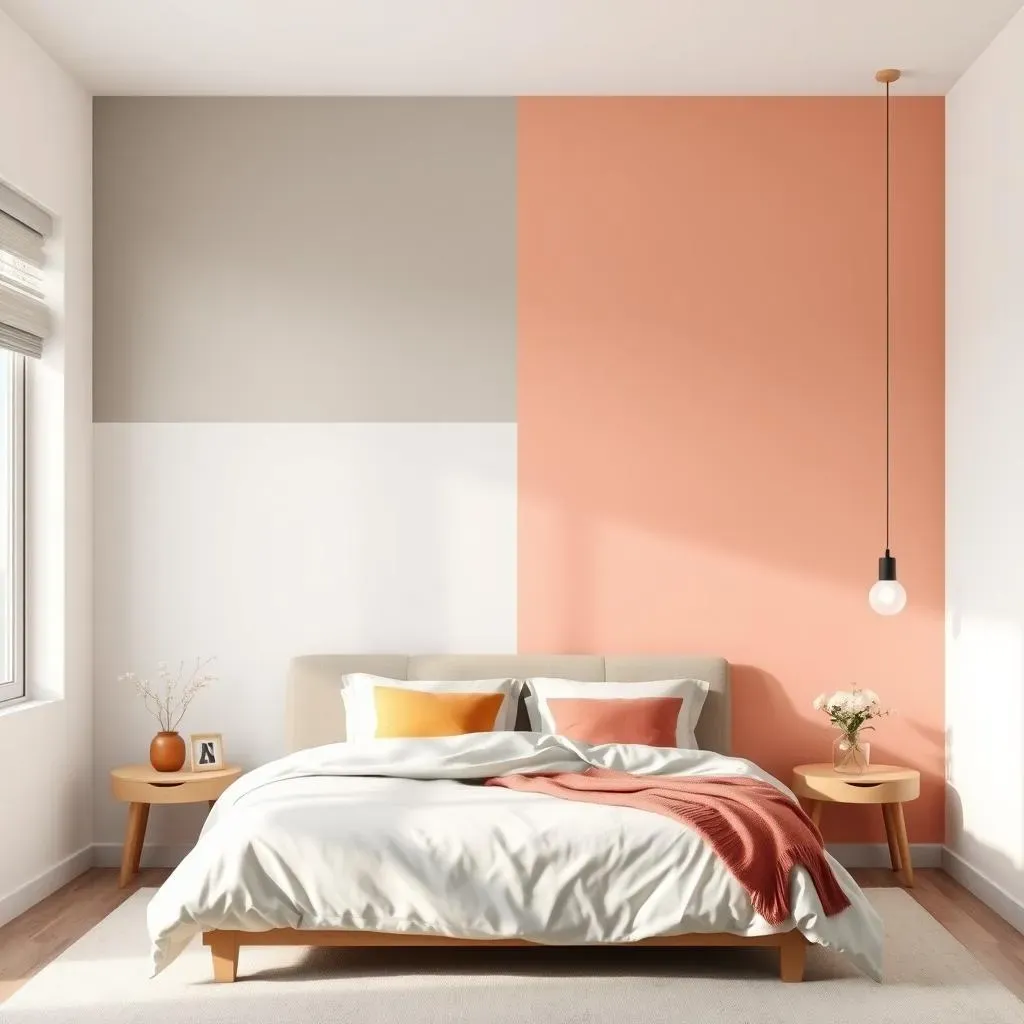
DIY and Beyond: Creative Ideas for 2 Accent Walls in Your Bedroom
Budget-Friendly Brilliance: DIY Accent Wall Ideas
Alright, let's get crafty! You don't need to break the bank to create stunning 2 accent walls in bedroom. There are tons of DIY options that are both budget-friendly and seriously stylish. Peel-and-stick wallpaper is a fantastic option for renters or anyone who wants a temporary change. Stenciling is another great way to add a unique pattern to your walls without spending a fortune. Grab some stencils from your local craft store, choose your favorite paint colors, and get creative! You can create intricate designs, geometric patterns, or even whimsical murals.
Feeling a bit more ambitious? Try creating a grid wall using inexpensive wood trim. This is a great way to add texture and dimension to your bedroom, and it's surprisingly easy to do. Simply measure and cut the trim to your desired size, then attach it to the wall using construction adhesive or nails. Paint the entire wall a single color for a cohesive look, or use different colors to highlight the grid pattern. The possibilities are endless!
Thinking Outside the Box: Unique Materials and Techniques
Ready to take your 2 accent walls in bedroom to the next level? Let's ditch the paint for a minute and explore some more unconventional materials and techniques. Wood paneling is a great way to add warmth and texture to your bedroom. You can use reclaimed wood for a rustic look, or opt for sleek, modern panels for a more contemporary vibe. Another option is to use fabric to create a soft and luxurious accent wall. Simply stretch fabric over a wooden frame and attach it to the wall. This is a great way to add a pop of color or pattern to your bedroom, and it's surprisingly easy to do.
Consider using unexpected materials like metal, concrete, or even plants! A metal accent wall can add a touch of industrial chic to your bedroom, while a concrete wall can create a cool and minimalist vibe. Or, if you're feeling adventurous, try creating a living wall with plants! This is a great way to bring the outdoors in and add a touch of nature to your bedroom. Just make sure you choose plants that thrive in low-light conditions and that you have a good watering system in place.
Double the Impact, Double the Style: Your Bedroom, Your Rules
So, there you have it. Stepping outside the one-accent-wall box opens up a world of design possibilities for your bedroom. By carefully considering color palettes, material harmony, and strategic placement, you can create a space that’s not only visually striking but also deeply personal. Whether you're a seasoned DIYer or just starting your decorating journey, remember that the most important thing is to have fun and let your creativity shine. Go ahead, embrace the power of two and transform your bedroom into a stylish sanctuary that truly reflects you.
